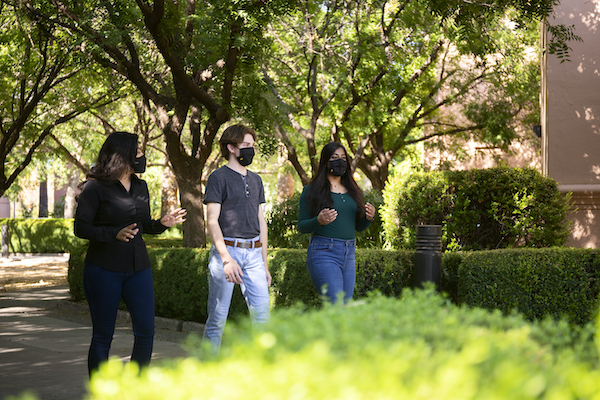ASU recovery and mental health leaders are more than here to help
For Alexa Miller, Recovery Rising is more than a resource to support students seeking to overcome substance abuse, body image and eating issues. Miller said the multifaceted campus organization is here to build a community and help Sun Devils thrive.
“We are here and we always meet at these times, so you can go and make what you want out of it,” said Miller, the president of the organization. “It’s not a club where you have to be absent from drugs. You can go and even just listen. You don’t even have to have an issue you’re dealing with.”
Recovery Rising and Friends of Recovery are both designed for ASU students in recovery from drug addiction, alcohol abuse, traumatic experiences, self-harm and eating disorders to have a space where they’re listened to and can freely express their stories, struggles or any topic that comes to mind.

Seniors Drew Johnson and Destiny Montero go on a social distancing walk with junior Srushti Reed to keep their spirits up.
For Recovery Rising, meetings are held virtually at specific dates and times, which you can find by visiting the program’s Instagram, @ASURecoveryRising. Miller believes an important part of a recovery community is accepting the responsibility it takes to show up consistently and being accountable in other people’s lives, and she’s learned this through her own experience with staying in contact with close family and friends.
“The main thing I wanted to create in college is a community,” said Miller, who is a sophomore at ASU studying psychology and has plans to become a drug and abuse counselor. “I thrive when I have a community of people who care about me and support me. That’s what we’re trying to do.”
Ultimately, through non-judgment, compassion and love as the “antidote to addiction,” Miller says the stigma and taboo around addiction can be flipped. It’s all about allowing other people’s experiences to be heard and expressed without any filters due to concerns over judgment or not tackling a behavior in a certain way.
“You kind of have to think like that in order to stop the problem behavior,” Miller said. “As time goes on, you’re able to develop an ability to stay in that gray area where I can do this and I can’t do this.”
ASU’s peer-to-peer program Devils 4 Devils has long been committed to developing a similar space in which students and community members can freely discuss their personal mental health experiences.
Emily Leon, the outreach chair at Devils 4 Devils, said active listening is at the core of their empathy training, which was delivered to more than 1,500 students in the ASU community this fall. Leon, a senior at ASU studying psychology, said that practicing empathy is the closest we can get to sharing an experience with someone else, and listening is our sharpest tool.
“It might be helpful for someone to say, ‘Hey, we’re all going through this,’” Leon said. “But, that can come off dismissive, so we talk a lot about validating feelings. A lot of the time people just want to talk and for you to listen.”
However, Leon acknowledged it’s not always easy for friends and family to give the proper support to someone in recovery or struggling with mental health, but it’s worth practicing empathy and learning how to identify key indicators of struggle.
“There are a ton of ways that people reach out, so our main goal is to get people to tune into those little things that may be bigger than they seem,” Leon said. “You might notice your friends aren’t doing well academically or negatively talk about dropping out. It’s things that seem out of character.”
Similar to Recovery Rising, Devils 4 Devils holds peer-led community circles each day of the week, centering on different topics and activities related to mental health. Leon’s Monday Night Games circle is held each Monday at 5 p.m., and like Miller’s community at Recovery Rising, there are no requirements for attending.
“I always tell people, if there's nothing going on, or if there is, we don’t have to talk about it if you’re not ready,” Leon said. “We’re here to listen more, so if you’re here to take your mind off things, we’re happy to help you do that too.”
Stay connected with Recovery Rising through their Instagram and Facebook page. You can find Devils 4 Devils as well on Instagram.